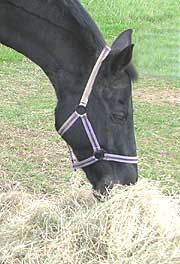Symptoms,
Causes and Treatment of Choke in Horses
Choke is the common name for an obstruction
of the oesophagus of a horse.
One of the key features of equine choke is the appearance of
food materials at the horse's nostrils. This is beacause the arrangement
of the palate prevents food that is regurgitated from re-entering
the horse or pony's mouth.
A prolonged episode of choke can cause scar tissue in the oesophagus
and pneumonia can occur as a result of fluid
or feed getting into the lungs during an attack.
 Although
the muscles in a horse's gullet are strong, their
strength is not limitless. Although
the muscles in a horse's gullet are strong, their
strength is not limitless.
A greedy pony or horse may get Choke
when he gulps down a large mouthful of dry hay, sugar
beet, pony nuts, carrots or other dry and absorbent food.
The waves of contraction in the muscular wall of the horses's
oesophagus may only succeed in carrying the food down
part way. The contractions may run out of steam somewhere in the
lower neck or chest of the horse.
Another swallow will simply pile up more of the food at the site
of the blockage.
Once the process has been clogged up the jammed mass of food
material will soak up the lubricating secretions from the lining
of the horse's oesophagus. Then the gullet will become dry and
thoroughly impacted.
Symptons of Choke in a horse or pony
- The horse will extend and stretch his neck out
- Regurgitated food and white foamy saliva coming from the horse's
nostrils
- Violent coughing, retching and gasping.
- Sometimes the horse may appear to have colic.
- Difficulty in swallowing
- The horse may blow out feed through his nose and mouth .
If the Choke is not cleared by the initial bout of of coughing
and heaving the horse will move into a quieter phase of choke
in which the reflex stimulation to cough is lost
The horse or pony will become depressed and stand about with
food debris and saliva coming out of his nostrils each time that
he swallows.
How to treat Choke
- Although many cases of choke will clear by themselves this
IS a medical emergency so call your vet immediately you see
these symptoms.
- If the choke has not cleared by the time he arrives the vet
will insert a stomach tube and gently flush the oesophagus until
the blackage is washed away - this may take some time.
- Some horses need to be sedated to encourage relaxation of
the muscles which may be clamped tightly around the blocked
segment.
- In very bad cases surgery may be necessary under general anaesthetic.
An incision may be made into the oesophagus to remove the blockage
or the pressure of a hose pipe may be used to wash out the obstruction.
- Follow up treatment includes relaxant drugs and antibiotics
as bruising and ulceration of the oesophagus is common - nevertheless
cases of choke in horses carry a very good prognosis.
- Whilst healing the horse's diet should mainly consist of a
soft gruel fed little and often. Hay and grass should be avoided.
|